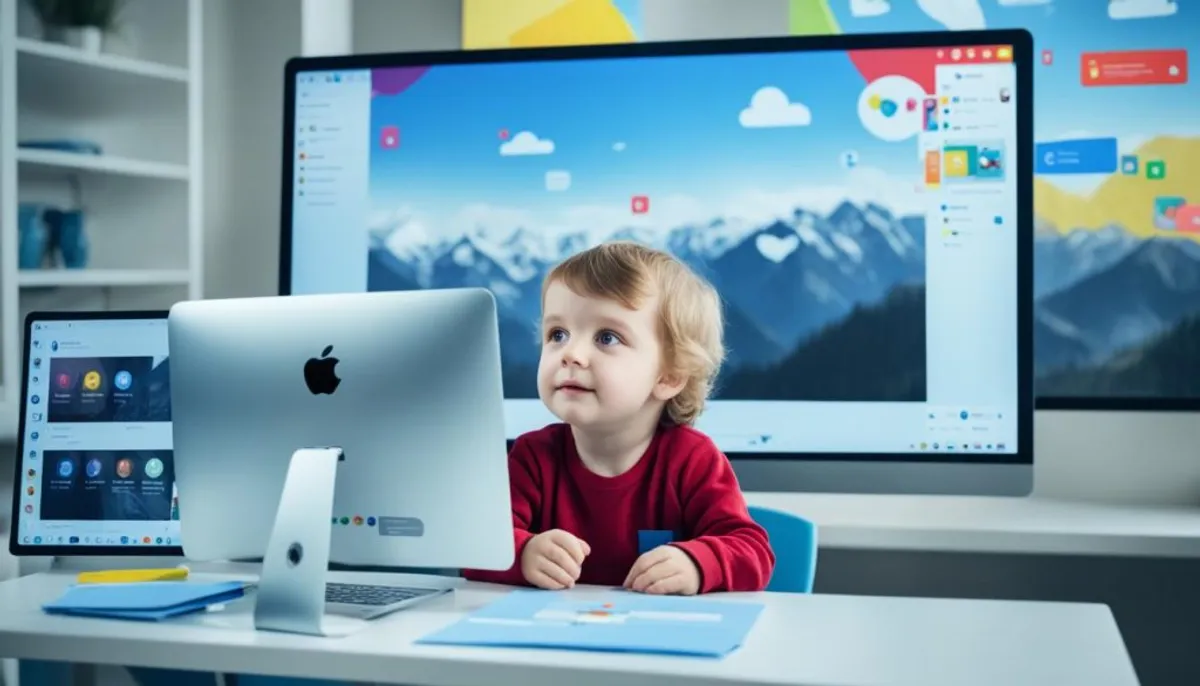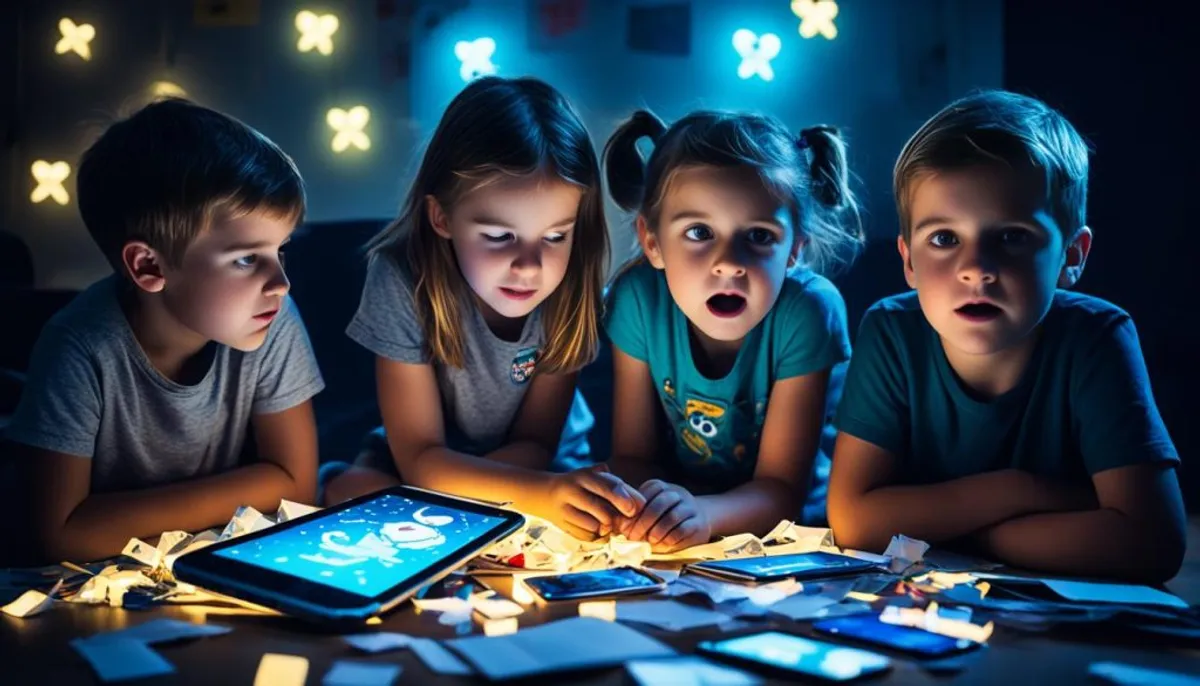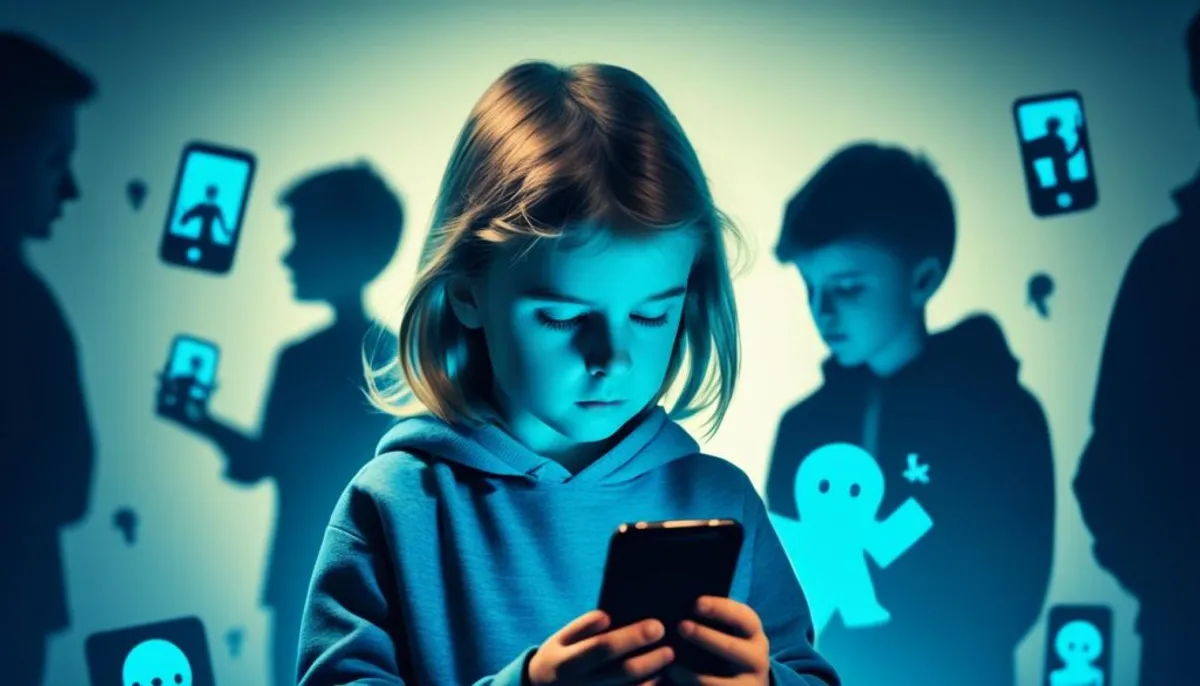Social networking is a big part of life for many kids today. Parents worry about how it affects their kids’ growth and happiness. We’re concerned about the social media impact on kids, online safety for minors, and the dangers of cyberbullying and internet addiction in youth.
Experts say that too much tech use, especially social media and texting, can hurt teens’ mental health and social skills. Young kids learn new things fast, and teens grow a lot too. We need to watch how tech changes our kids’ lives.

Worries about social networking and children include anxiety, lowered self-esteem, and dangers from online predators and viral trends. As parents, we must understand how tech affects our kids’ digital wellbeing. We should make sure they use the internet safely and right for their age.
The Prevalence of Social Media Among Children
Social media has become a big worry for parents and experts. Studies show that about 40% of kids aged 8 to 12 use social media, even though many platforms say they should be older. This is a big concern.
More and more kids are using social media, with 95% of teens aged 13 to 17 on it. This shows how popular social media is with young people, often ignoring the age limits.

Social media is quickly becoming a big part of kids’ and teens’ lives. This raises questions about its good and bad effects on their health and growth. We need to understand this issue to tackle the digital age’s challenges and chances.
Negative Effects of Social Media on Children
Social media is a big part of many kids’ lives, but it can also have bad effects. Kids face issues like body image problems, cyberbullying, and seeing dangerous trends online. These concerns are growing.
Body Image Concerns and Low Self-Esteem
Kids see perfect, edited images online that can make them unhappy with their bodies, leading to body image concerns. This is especially true for teenage girls. It can hurt their mental health and overall happiness.
Cyberbullying and Exposure to Hate-Based Content
Social media can be where cyberbullying and hate speech spread. A study found 64% of teens often or sometimes see hate content online. This can really hurt a child’s feelings and make them feel unsafe.
Risks of Online Predators and Exploitation
Kids are at risk of meeting online predators because of social media’s anonymity. Almost 6 out of 10 teen girls have been contacted in a way that made them uncomfortable. This shows the dangers kids face online.
Dangerous Viral Trends and Tic-Like Disorders
Kids might join risky online trends without knowing the risks. Research links TikTok use to tics and tic-like disorders in some young people.

As more kids use social media, we need to know about its dangers, including body image concerns. Parents, teachers, and leaders must act to protect kids. By understanding the risks and setting rules, we can help kids use the internet safely and wisely.
is social networking harmful to children
Social media lets kids connect and engage, but it can harm their mental health and social growth. Let’s look at the main concerns about social networking in kids.
Increased Irritability, Anxiety, Depression, and Lack of Focus
Studies show that too much social media use is linked to more irritability, anxiety, depression, and trouble focusing. The constant stream of information and the need to keep up with friends can hurt kids’ emotional health and mood.
Missed Opportunities for Real-Time Social Skill Development
Kids who spend a lot of time on screens might miss out on face-to-face interactions. These interactions are key for learning social skills. This can make it harder for them to handle social situations and develop important people skills.
Constant Connectivity and Lack of Alone Time
Being always connected through social media can make kids anxious and cut down on alone time. This constant connection can be too much. It can mess with the balance between being with others and being alone to think and recharge.
The social media impact on mental health, social skills development, and online connectivity and mental wellbeing are complex issues. While there are risks, it is also essential to recognize the positive effects of social media. Parents and teachers need to find a balance. This balance ensures kids grow up healthy despite the pros and cons of social networking.
Potential Positive Effects of Social Media
Social media has both good and bad sides for kids. It can help in two main ways: by building empathy and improving communication skills. Additionally, the positive effects of social media open doors for fun and interactive learning.
Developing Virtual Empathy and Online Communication Skills
Social media helps shy kids get better at making friends online. They learn to share feelings and build relationships in a safe space. This boosts their online communication skills, which are key today.
Opportunities for Engaging and Interactive Learning
Social media is also great for learning. Sites like YouTube, Instagram, and TikTok make learning fun and hands-on. Kids can dive into topics they like, see things in a new way, and even make their own lessons. This makes learning exciting and helps them remember more.
Yes, social media has downsides for kids. But, it also has upsides. Using it to build empathy, improve communication, and make learning fun can make a big difference. This way, kids can use social media in a positive way.
Conclusion
Social media use among kids and teens is complex, with both good and bad sides. It can lead to issues like body image worries, cyberbullying, and mental health problems. Yet, it also offers chances for learning empathy, improving online communication, and interactive learning.
Parents should talk openly with their kids about social media. They should set clear rules and watch over their online activities. This helps keep a healthy balance and supports their well-being. By knowing how social media affects kids, we can guide them to use it wisely and make the most of its benefits.
This article highlights the need for a careful balance when it comes to social networking for kids. Parents and caregivers should stay updated, involved, and proactive. This way, kids can gain the skills and strength needed to do well in the changing digital world.
RelatedRelated articles



